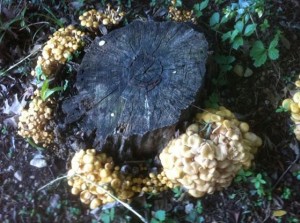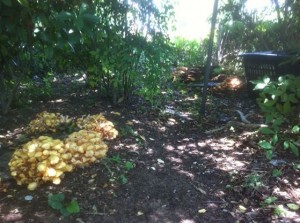This may strike a lot of people as crazy. That’s fine. It is a perspective and you can take it or leave it. I’m not trying to change your point of view. This post is simply question my perceptions, yours, and the masses.
Nature inherently wants to create abundantly healthy organisms and ecosystems. It is continually attempting to restore every individual and system through a continual feedback loop. However, the limitation is in our ability to listen to a speechless form of communication. Instead, nature communicates through the lens of reality. Weeds in the garden and immune disorders that consumes its host are a few examples out of many.
Weeds in the Garden
Common weeds in the garden are thistles, dandelions, and grasses. Each has their own story but they are all common to poor soil conditions, unfilled space in the garden, or a lack of diversity. Taking the time to learn about each plant focuses more light into what Nature is communicating to us. Thistles are deep rooted, grow in many soil conditions, and grows in disturbed (tilled) or neglected soils. Dandelions are similar to thistles; they have a deep tap root and grow in disturbed/neglected soils. Deep tap roots mine nutrients and make them available to other plants when the plant finishes its life cycle. Instead of pulling out these plants we can allow it to grow and finish its life, eat it, or cut it back before it goes to seed (when you see the flowers cut it back). Grasses also tend to grow in disturbed soils. They tend to mat up and take over a garden if not carefully managed. However, they also have beneficial aspects to them as well. Grasses have fungi growing on their roots which help facilitate nutrient exchange. These fungi are known as mycorhizzal since they grow into the roots of plants. If these grasses are next to vegetables the fungi will also grow into the roots of those plants and also help facilitate the exchange of water and nutrients. Because some grasses do form mats and take over the garden, it’s fine to manage them by trying to remove them. Another way of managing them is to allow animals to eat them for you. The overall message is that everything in nature performs a function. If we take a step back, nature will always fill a vacuum like an empty spot in the garden. There are no weeds.
No Diseases
Honey mushrooms are commonly referred as parasitic mushrooms that cause disease in trees. They grow into the roots of trees and slowly feed off of decaying wood within the trunk. Over time, the tree will die and the fruits of the mushroom will spring out of the ground to spread its spores. If we take a step back and observe the environment around our trees, there is a common pattern of nutrient and water deficiency. At my parents house in Arlington, Tx, we have clay soils that go down 2-3 feet before you hit hard subsoil. Every rain, the water tends to run off rather than soak into the soil to water and hydrate the plants. During the dry summer months, this means inadequate amounts of water. Every  Autumn, as the leaves fall they are raked up and hauled off. Nutrients are leaving the system causing greater devastation to the yard. In the past couple of years, the amount of trees being lost in my parents and neighbors yard has been more than 15 oak trees cut and removed. As these stumps decay, we see the honey mushroom rising out of soil. Now, what is the function of a mushroom? It is a decomposer which cycles nutrients back into the system. Since there are no nutrients cycling and there is little water, the honey mushroom is returning nutrients back and spreading its spores and extending its mycelium to infect other susceptible tree roots.
Autumn, as the leaves fall they are raked up and hauled off. Nutrients are leaving the system causing greater devastation to the yard. In the past couple of years, the amount of trees being lost in my parents and neighbors yard has been more than 15 oak trees cut and removed. As these stumps decay, we see the honey mushroom rising out of soil. Now, what is the function of a mushroom? It is a decomposer which cycles nutrients back into the system. Since there are no nutrients cycling and there is little water, the honey mushroom is returning nutrients back and spreading its spores and extending its mycelium to infect other susceptible tree roots.
When we build up our soils, we are also allowing more water to hydrate and stay within the system. In time this creates a healthier ecosystem that can support the growth of these trees and other plants. In time, other types of fungi will grow and compete with the honey mushroom pushing back its growth.
Accept the Feedback
What we call weeds and diseases in nature and for ourselves is only a perception. If we look further and understand their functions we can begin to learn their processes and functions in these environmental and biological systems. When we begin to understand a little bit of why they are growing and becoming prevalent we can begin to change our habits and behaviors. This initial step forces us to realize that we are a part of this system, and we are influencing it. However, before we can even begin to change the world outside we must change the way we perceive the world within and around us.
So are there weeds? Are there diseases?
Or is it all just feedback loops?
Resources
Weeds
Field Guide for Managing Annual and Biennial Invasive Thistles in the Southwest
Controlling Cynara Cardunculus (Artichoke Thistle, Cardoon, etc.)
Grass
Co-existing grass species have distinctive arbuscular mycorrhizal communities
Mycorrhizae and Turfgrass
SOIL FUNGI By Elaine R. Ingham, Oregon State University
Honey Mushrooms
Armillaria Root Disease – US Department of Agriculture Forest Service
Decomposers

